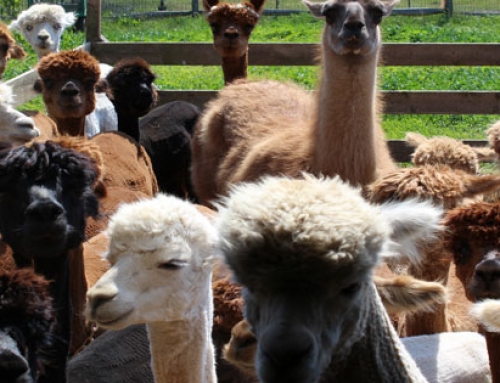A Cria is a baby Alpaca or an Alpaca that is less than one year old. If you have ever had an Alpaca Cria on your farm, you will know how much care they need. From wondering away from the pack to getting stuck in places that the large alpacas wouldn’t even think about going. It’s a lot like taking care of an toddler when they first learn to walk!
Your Cria will typically arrive early in the morning or late in the afternoon. Mothers do not want to welcome their young by dropping them into the hottest part of the day. If your Alpaca Cria arrives outside of that window, it tends to point to a complication. That is not a rule, just an observance we have made in our experience.
The fun is just beginning when they get out into the scary world. You will need to make sure that they are getting plenty of food and developing as they should. It is a good idea to check on them at least twice a day to see how they are doing.
Feeding Your New Alpaca Cria
Cria’s should feed off of milk from the mother, but some may not know to do that. Your Alpaca Cria should be drinking mother’s milk within 4 hours of birth at the very most. If they are not drinking within 4 hours then you should call a vet immediately.
This can be a sign of a few things that a Cria might run into. Some don’t know how to get the milk from their mother or are scared of their surroundings. Put them in their own pen or enclosure so that the newborn feels more secure.
This can also mean that there is something going on with the mother. Young mothers may not know that they should make the new Cria drink milk right away and may need a quick lesson. They could also be lacking in the ability to produce enough milk to keep up with what the new Cria needs.
Behavior of Your New Alpaca Cria
Your new Cria should be in the kush position and alert within 5 or 10 minutes of entering the world. Within 30 minutes, they should be at least making an attempt to stand up and start exploring. They should be standing safely within about 3 hours of birth.
Keep an eye on the progress and make sure that the mother is helping and encouraging the process. If they are obstructing the process, you may need to step in or even separate them. Some young mothers just don’t want to have anything to do with the new alpaca Cria. They will need some time to understand what just happened and what they need to do.
What To Watch Out For
When you get a hold of the new Cria to do a quick checkup, you want to make sure that you see some teeth starting to poke through. It shouldn’t take long for the teeth to start developing. If you don’t see any progress in growing teeth within the first week, contact your vet.
Another sign that something is wrong is if the Alpaca Cria displays an overall lack of energy. They should be a little ball of energy, running in circles around anyone who will watch. If they are laying down in the barn all day then you should notify a vet as soon as possible.
If your Cria is born during a cold part of the year, it is important to make sure that they stay plenty warm. Their internal organs need warmth in order to do what they are meant to do. Cover your Alpaca with a thick blanket and throw some warm water bottles under the blanket as well.
Most people put their Alpaca Cria in a Cria jacket shortly after it is born. This helps them stay warm while also protecting the fleece from all the playing. Keeping a new Cria warm is one of the keys to survival and without this they will not have a great chance of surviving.
When You Can Relax
The first 4 days are the most critical times in the Alpaca Cria’s life. Most Alpaca breeders will check on their newborns hourly during this period. You will need to make sure that they stay warm and that the bond with their mom.
Their mom should keep them warm at night unless they are sick. If the mom senses that the young Cria is a liability when it comes to predators, they will stay away in an attempt to stay alive themselves. If they do not cuddle with the Cria at night, you will need to provide blankets and maybe even cuddle them yourself.
Once the mom takes over and is responsible for the Alpaca Cria, you can spread your checkups out a little more. Still keep a close eye on progress, but you can check a little less often. Once you hit a week, you should be in the clear. Don’t stop checking all together, but you are less likely to run into problems before you have time to react.








Leave A Comment